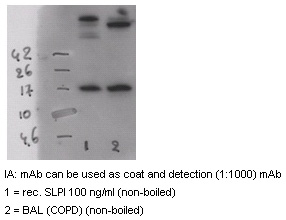SLPI Mouse Monoclonal Antibody [Clone ID: 31]
Other products for "SLPI"
Specifications
| Product Data | |
| Clone Name | 31 |
| Applications | ELISA, IHC, WB |
| Recommended Dilution | Immunohistochemistry on frozen sections: The typical starting working dilution is 1:50. Immunohistochemistry on paraffin sections (1,3-7): The typical starting working dilution is 1:50. Immunoassays (1-4). Western blot: The typical starting working dilution is 1:50. |
| Reactivities | Human |
| Host | Mouse |
| Isotype | IgG1 |
| Clonality | Monoclonal |
| Immunogen | SLPI purified from sputum |
| Specificity | The monoclonal antibody 31 recognizes secretory leukocyte proteinase inhibitor (SLPI). The reactivity of the antibody with isolated domains of SLPI was evaluated using domains obtained by cleavage using partial acidic hydrolysis. Therefore, monoclonal antibody 31 recognizes also other SLPI cleavage products. |
| Formulation | PBS Label: Biotin State: Liquid 0.2 µm filtered Ig fraction Stabilizer: 0.1% bovine serum albumin Preservative: 0.02% sodium azide |
| Concentration | lot specific |
| Purification | Protein G |
| Conjugation | Biotin |
| Storage | Store at 2 - 8 °C. |
| Stability | Shelf life: one year from despatch. |
| Gene Name | secretory leukocyte peptidase inhibitor |
| Database Link | |
| Background | SLPI was identified as an alarm reactant and expression is induced by inflammatory factors like LPS, IL1β, TNFα and neutrophils elastase. SLPI is a relatively small basic antiprotease of 11.7 kDa and is a cationic non-glycosylated protein consisting of 107amino acids. SLPI has a high affinity for the neutrophil serine proteinases, elastase and cathepsin G. Orthologues of SLPI have been found in mice, rate, pigs and sheep. It consists of two highly similar WAP (‘whey acid protein’)/four-disulphide core domains. SLPI contain 16 cysteine residues which assemble into eight disulphide bridges (four in each WAP domain). SLPI is constitutively expressed at many mucosal surfaces and is produced by a variety of epithelial cells, including respiratory, intestinal and amniotic epithelia. Expression is also detected in mast cells, neutrophils and macrophages. Expression of SLPI gene is significantly increased by progesterone and by the pro-inflammatory cytokines TNF-α and IL1-β. Although SLPI has been shown to inhibit a spectrum of proteases (including HNE, cathepsin G, trypsin, chymotrypsin and chymase), its main action in this regard is likely to be the inhibition of elastase, as indicated by its low dissociation constant and favourable kinetics of inhibition for this enzyme. SLPI has been described in several body fluids like seminal fluid, bronchial fluids, cervical fluids and saliva. It has been found to be antibacterial, antifungal, anti-retroviral, and to have an important role in mucosal defence. SLPI might also facilitate tumor spread, contributing to wound healing, is elevated in sepsis and levels seem to correlate with oral candidiasis in HIV-1 positive patients. |
| Synonyms | SLPI, WAP4, WFDC4 |
| Reference Data | |
Documents
| Product Manuals |
| FAQs |
| SDS |
{0} Product Review(s)
0 Product Review(s)
Submit review
Be the first one to submit a review
Product Citations
*Delivery time may vary from web posted schedule. Occasional delays may occur due to unforeseen
complexities in the preparation of your product. International customers may expect an additional 1-2 weeks
in shipping.






























































































































































































































































 Germany
Germany
 Japan
Japan
 United Kingdom
United Kingdom
 China
China



